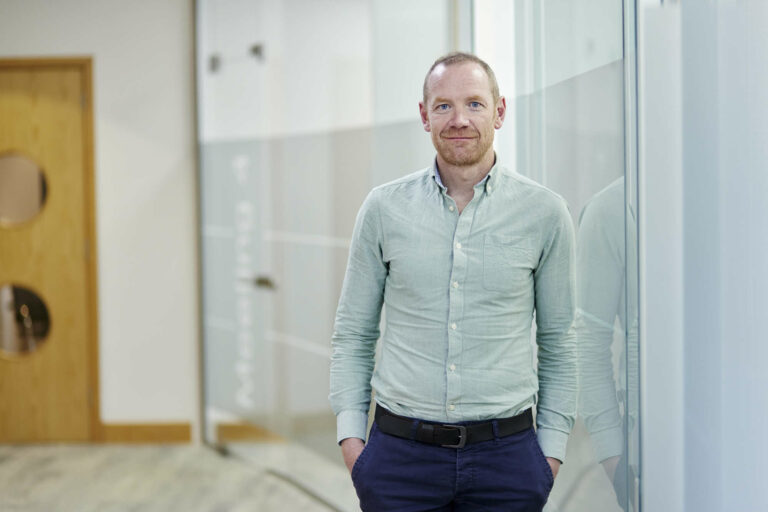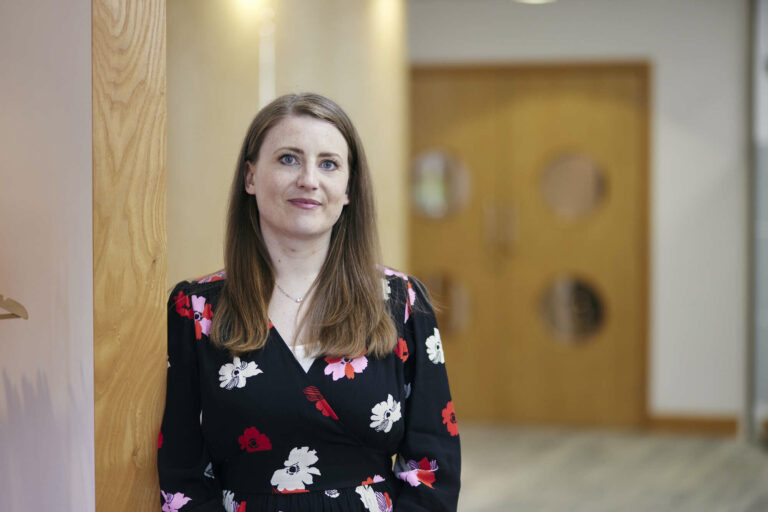
Every quarter, NHS England release statistics on the waiting times for cancer patients. Shortly after their release, we interpret the statistics and publish an article. This is the latest quarterly statistic release from January to March 2023 (Quarter 4 2022/23).
As a result of the NHS Cancer Plan, access to diagnosis and treatment has evolved and we now have the ”62 day pathway”. This provides the following target timescales for diagnosis and treatment:
- 14 days – from the GP referral to first being seen by a specialist
- 28 days – from the GP referral to the patient being told they either do or do not have cancer
- 62 days – from GP referral to first treatment
These deadlines are ‘the operational standard’. 100% achievement is not expected. Patients may not be available for treatment in time, choose to delay treatment and there may be medical reasons not to treat them so quickly.
Compliance with target times is measured every 3 months and the findings are reported. In summary, we are still falling behind the target treatment times. The only improvement is that in Quarter 4, more patients were referred to specialists and seen within 14 days. All other diagnosis/treatment times have worsened. More needs to be done to get this back on track.
The ”two week wait”
A patient with suspected cancer should be referred to and seen by a specialist within two weeks. The operational standard states that 93% of patients should be seen within this time frame.
In Quarter 4 of 2022/23 (January – March), 718,226 patients were referred to and seen by specialists for suspected cancer. Of these, 83.9% were seen within 14 days, compared with 78.9% in Quarter 3 of 2022/23 (October to December 2022/23). In contrast, this was 78.9% at the same time last year (Quarter 4 2021/22). So overall, there is some improvement which is positive. Below is a graph which looks at this data.
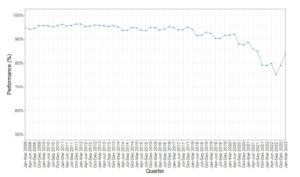
Source: Q4 – Cancer waiting times quarterly commentary (provider based) provisional.
31 day wait from diagnosis to first treatment
Patients should wait no longer than one month (31 days) from diagnosis to the start of treatment. The operational standard for this measure is 96%.
Between January and March 2022/23 (Quarter 4), 82,964 patients began their first definitive treatment for cancer. Of those, 90.8% started within the 31-day timescale, a slight decrease from Quarter 3 of 2022/23 which was 92% and again from Quarter 4 of 2021/22 which was 92.3%.
The proportion of patients who started treatment within the 31 days was lower for admitted patients (86.7%), compared to non-admitted patients (96.6%).
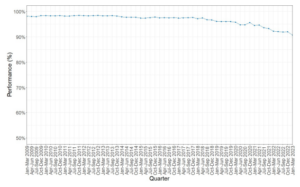
Source: Q4 – Cancer waiting times quarterly commentary (provider based) provisional.
In relation to different cancers, the percentage of patients who received their first treatment within 31 days is as follows:
– Breast cancers – 88.9%
– Lung cancers – 93.0%
– Lower gastrointestinal cancers – 88.8%
– Urological cancers – 91.3%
– Skin cancers – 87.7%
31 day wait for second or subsequent treatment
Patients should wait no longer than 31 days for a second or subsequent treatment. For quarter 4 2022/23 and different treatment types, the data is broken down as follows:
– Anti-cancer drug regimen (chemotherapy, immunotherapy etc) – 97.2% were treated within 31 days. This is a slight decrease from Quarter 3 2022/23 at 98.3% and again from 98% in Quarter 4 2021/22.
– Surgical Treatment – 77.5% of patients received their second or subsequent treatment within 31 days or fewer. Compared to 81.2% in Quarter 3 of 2022/23 and 81.9% in the same period last year. The target is 94%.
– Radiotherapy – 88.3% of patients received their treatment within 31 days or fewer compared to the target of 94%. This is slightly worse than the 90.6% in Quarter 3 of 2022/23 and also from 93.3% in Quarter 4 of 2021/22.
62 day urgent referral to first treatment
The operational standard is that 85% of patients should wait no longer than 62 days to begin their first treatment. In Quarter 4 2022/23, 45,681 patients began treatment following an urgent referral. 58.8% were within 62 days. This is a decrease on Quarter 3 2022/23 (61%) and Quarter 4 of 2021/22 (64.2%). The graph below shows that this is a pattern that emerged far before the pandemic.
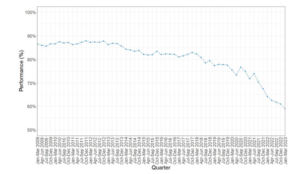
Source: Q4 – Cancer waiting times quarterly commentary (provider based) provisional.
Broken down by cancer type, the following patients received treatment within the 62-day guideline:
– Breast cancers – 73.3%
– Lung cancers – 49.8%
– Lower gestational cancers – 39.9%
– Urological cancers – 46.9%
– Skin cancers – 83.3%
Screening Services
In quarter 4 of 2022/23, 5,681 patients received treatment after a referral from screening. 66.4% were treated within 62 days. This is a drop from 69% in Quarter 3 of 2022/23 and again, a drop from 68.3% in Quarter 4 of 2021/22.
Conclusion
The statistics from Quarter 4 show little improvement, save for that more patients were referred to specialists and seen within 14 days (up 5% from Quarter 3). It is worrying that the percentages of patients who received their first treatment within 31 days is falling. So is the number of patients who received treatment within the 62-day guideline.
In December 2020, the Government launched the ‘Cancer Services Recovery Plan’ which aimed to restore cancer services following the pandemic, focusing on reducing patient waiting times and ensuring there is sufficient capacity. The initial target date was March 2021, which was pushed back to March 2022 and subsequently to March 2023.
The House of Commons Committee report states that the NHS is already falling short of expectations. The target has not been met. Waiting times for cancer treatment are especially worrying and being off track means more patients suffering the unacceptable consequences of waiting too long. The report highlights that NHS England made unrealistic assumptions about the first year of recovery, including that the levels of Covid would be lower and there would be minimal adverse effects from winter pressures.
Managing NHS backlogs and waiting times in England – Committee of Public Accounts (parliament.uk)
It is more important than ever to seek medical help if you have troubling symptoms to seek medical opinion. Cancer detected early is often easier to treat and may have a better outcome. Early diagnosis saves lives.
We are clinical negligence experts
Enable Law specialises in medical negligence, and we are here to advise and help you if you have concerns about the treatment of your cancer care. Should you have any concerns regarding your medical care, or are considering a cancer compensation claim, please contact us to speak with one of our specialist advisors.


